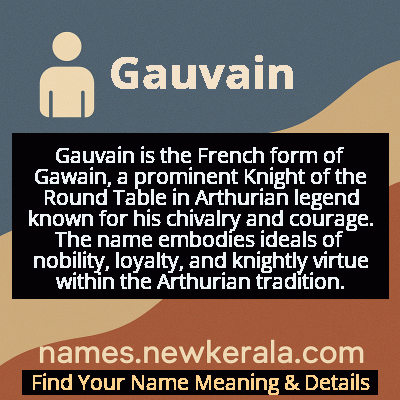Gauvain Name Meaning & Details
Origin, Popularity, Numerology Analysis & Name Meaning of Gauvain
Discover the origin, meaning, and cultural significance of the name GAUVAIN. Delve into its historical roots and explore the lasting impact it has had on communities and traditions.
Name
Gauvain
Gender
Male
Origin
Arthurian
Lucky Number
3
Meaning of the Name - Gauvain
Gauvain is the French form of Gawain, a prominent Knight of the Round Table in Arthurian legend known for his chivalry and courage. The name embodies ideals of nobility, loyalty, and knightly virtue within the Arthurian tradition.
Gauvain - Complete Numerology Analysis
Your Numerology Number
Based on Pythagorean Numerology System
Ruling Planet
Jupiter
Positive Nature
Optimistic, inspirational, and creative.
Negative Traits
Scattered, exaggerating.
Lucky Colours
Yellow, gold, purple.
Lucky Days
Thursday.
Lucky Stones
Yellow sapphire.
Harmony Numbers
1, 2, 9.
Best Suited Professions
Arts, writing, communication.
What People Like About You
Creativity, optimism.
Famous People Named Gauvain
Sir Gawain
Arthurian Knight
Central figure in Arthurian legends and protagonist of 'Sir Gawain and the Green Knight'
Gauvain de la Roche
Historical Knight
Prominent French crusader during the Albigensian Crusade
Gauvain de Germiny
Religious Leader
Influential 19th-century French bishop and theological writer
Name Variations & International Equivalents
Click on blue names to explore their detailed meanings. Gray names with will be available soon.
Cultural & Historical Significance
The 14th-century masterpiece 'Sir Gawain and the Green Knight' represents the pinnacle of his literary significance, exploring profound themes of honor, temptation, and the conflict between personal integrity and social obligation. Throughout medieval literature, Gauvain serves as a moral compass and a standard against which other knights are measured. His relationships with other characters - particularly his complicated bond with his brothers and his rivalry with Lancelot - add depth to the Arthurian narrative, making him essential to understanding the political and personal dynamics of Camelot.
Extended Personality Analysis
Gauvain is characterized by a complex blend of chivalric ideals and human vulnerabilities that make him one of the most relatable Arthurian figures. His primary traits include exceptional courtesy, unwavering loyalty, and remarkable physical courage, earning him the title 'the Courteous' among Arthur's knights. Medieval texts often emphasize his diplomatic skills and his role as a peacemaker, demonstrating intelligence and emotional maturity beyond mere martial prowess. The legendary aspect of his strength increasing until noon symbolizes solar influence and cyclical power, adding a mythological dimension to his character.
However, Gauvain's personality also shows significant complexity through his fierce family loyalty and occasional impulsiveness. His vengeful pursuit of Lancelot following his brothers' deaths reveals a passionate, sometimes irrational side that contrasts with his usual measured demeanor. This combination of ideal knightly virtues with very human emotions creates a rich psychological portrait. His journey in 'Sir Gawain and the Green Knight' particularly showcases his internal struggle between maintaining his honor and confronting his own imperfections, making him a symbol of the eternal human conflict between aspiration and reality.
Modern Usage & Popularity
In contemporary naming practices, Gauvain remains an uncommon but meaningful choice, primarily used in French-speaking countries and among families with strong interest in Arthurian legends or medieval literature. The name has never reached mainstream popularity, preserving its distinctive and literary quality. There has been modest increased interest following recent Arthurian adaptations in film and television, particularly the 2021 'The Green Knight' movie. The name is more frequently encountered as a middle name than a first name, allowing parents to honor literary heritage without burdening a child with an overly unusual first name. Its usage is often deliberate, chosen by parents seeking a name with deep cultural resonance, chivalric connotations, and a connection to European literary tradition. The French spelling 'Gauvain' is less common internationally than the English 'Gawain,' making it a particularly distinctive choice outside France.
Symbolic & Spiritual Meanings
Gauvain carries profound symbolic weight as representative of solar nobility and the complex interplay between chivalric ideals and human nature. His legendary connection to the sun - through his waxing and waning strength - symbolizes natural cycles, honor's fluctuations, and the relationship between cosmic order and human endeavor. He embodies the concept of 'courtly love' and perfect courtesy while simultaneously representing the inevitable human failings that test these ideals. The Green Knight episode particularly symbolizes the confrontation with mortality and the importance of keeping one's word regardless of consequence.
Metaphorically, Gauvain represents the journey of self-discovery and the recognition that true virtue lies not in perfection but in honest self-assessment and growth. His character serves as a bridge between the idealized world of Arthurian romance and the complex reality of human psychology. The pentangle on his shield in 'Sir Gawain and the Green Knight' symbolizes the five knightly virtues and their interconnection, making him a living emblem of chivalric philosophy. His story teaches that nobility is demonstrated through how one handles moral challenges and learns from imperfection rather than through flawless execution of ideals.

